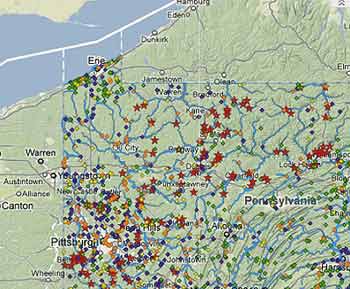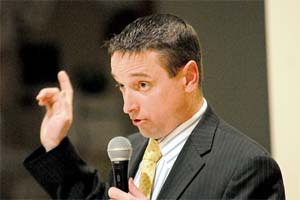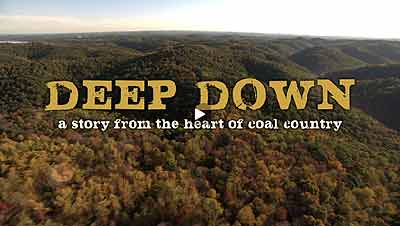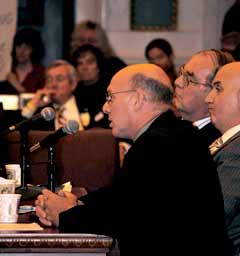Biblio
In 2004, the Political Economy Research Institute ranked Dominion Resources 27th among corporations emitting airborne pollutants in the United States, the second highest rating behind Duke Energy.
Dominion has a web page citing its ecosystem conservation efforts and contributions. It earned $15 billion in 2009. Its main ecosystem project received funding of $500,000 in 2009.
Dominion operates the nation's largest natural gas storage facility with 975 billion cubic feet of storage capacity and serves retail energy customers in 12 states.
For this company's information resources on non-conventional production from coal bed methane and Marcellus shale gas, see the web page, Appalachian Gateway Project.
Includes Landowner's Rights, Source of Supplies, Project Schedule, Environmental Considerations.
Created Sep 15, 2010 by Kyle Ferrar
This map shows the multitude of surface water withdrawals in Pennsylvania that are permitted by the PA DEP. The many points exemplify the magnitude that the PA community and economy relies on the quality of our surface water resources. The red stars show the oil and natural gas industry withdrawal locations.
Click to see more details on this map.
The current water management practices of the natural gas industry during the regional dry season are likely to have contributed to higher TDS concentration in the Monongahela River...
...the water withdrawals in the Monongahela River watershed are potentially causing a cumulative impact on flow volume in the river that magnifies all forms of pollution by increasing the pollutant concentrations. Much more research needs to be conducted on this issue, to ensure safe and sustainable permitting practices for water withdrawals.
See: Urbina, Ian. “Regulation Is Lax for Water From Gas Wells.” The New York Times 26 Feb. 2011. Web. 27 Feb. 2011.
See: With Natural Gas Drilling Boom, Pennsylvania Faces an Onslaught of Wastewater
See: WATER: Gas drilling in huge Appalachia reserve yields foul, briny byproduct - AP
The Mayor of tiny Dish, Texas, north of Fort Worth, continues to stir up controversy with his claims of air pollution from oil and gas activities causing health concerns in his community. The mayor appeared at the RRC's January 12 open hearing. You can watch his testimony here (go to item 17 on the agenda).
The mayor's appearance was prompted by an item placed on the agenda by Commissioner Michael Williams, which in turn had been prompted by a letter sent to the Commissioners by State Rep. Ron Burnam. Rep. Burnam's letter asked the RRC to place a moratorium on permits for wells in the Barnett Shale around Fort Worth until the Texas Commission on Environmental Quality (TCEQ) has finished its investigation of air quality in the area.
In response, Commissioner Williams proposed that the Commissioners write a letter to the Texas Attorney General asking for a formal opinion whether the RRC has authority to issue such a moratorium. (Rep. Burnam has also asked the City of Fort Worth to issue a similar moratorium on well permits in the city limits.) I have written about the controversy concerning the town of Dish in a previous post.
John McFarland is a shareholder at Graves, Dougherty, Hearon & Moody in Austin Texas specializing in representation of landowners and mineral owners in oil and gas matters in Texas.
See: Health Issues Follow Natural Gas Drilling In Texas
See: How Should We Do the Mountain?: Who the heck is Calvin Tilman?
Shale gas drilling is looming in the Upper Delaware River Watershed in NY and PA.
Why is this a threat to our water supplies?
What are the risks involved ?
Established in 1988 upon the appointment of the Delaware Riverkeeper, the Delaware Riverkeeper Network (DRN) is a nonprofit 501(c)(3) membership organization. DRN's professional staff and volunteers work throughout the entire Delaware River Watershed including portions of Pennsylvania, New Jersey, Delaware and New York.
See Delaware River Keeper. (2009). "Natural Gas Well Drilling and Production in the Upper Delaware River Fact Sheet".
"...An increased risk of stillbirths linked to the flaring of natural gas with high levels of hydrogen sulfide has been reported in cattle in Canada. Incidents in Texas are increasingly reported, especially in the Fort Worth region.
There is a need for thorough study of the environmental and health impacts of well drilling and development; there is very little on record. For instance, in Colorado a Health Impact Assessment has been called for as part of an Environmental Impact Statement due to documented pollution problems from natural gas development in Garfield County that require scientific analysis.
To date, research has been impeded because fracking fluids are protected from disclosure by federal protections granted to the oil and gas industry despite health and environmental impacts..."
Beverly May and Terry Ratliff grew up like kin on opposite sides of a mountain ridge in eastern Kentucky. Now in their fifties, the two find themselves in the midst of a debate dividing their community and the world: who controls, consumes, and benefits from our planet's shrinking supply of natural resources?
While Beverly organizes her neighbors and leads a legal fight to stop Miller Brothers Coal Company from advancing into her hollow, Terry considers signing away the mining rights to his backyard-a decision that could destroy not only the two friends' homes, but the peace and environment surrounding their community.
Co-Director/Cinematographer
 JEN GILOMEN is Director of Public Media Strategies at the Bay Area Video Coalition (BAVC).
JEN GILOMEN is Director of Public Media Strategies at the Bay Area Video Coalition (BAVC).
Co-Director/Editor
See: Shnayerson, Michael. 2008. Coal River. 1st ed. Farrar, Straus and Giroux, January 8.
See: Robert F. Kennedy, Jr. Mobilizes on Mountaintop Removal
See: Marsh Fork Elementary: Journey Up Coal River | A Community and Strip Mining
See: Mountaintop Removal (Film)
See: Mike Roselle clip 2-from the Southern Regional Jail West Virginia
See: Tree spiker : from Earth First! to lowbagging: my struggles in radical environmental action
See: Leveling Appalachia: The Legacy of Mountaintop Removal Mining
"I will start this story by saying that Aruba Petroleum has taken a great deal from my family, but they cannot take away our faith in God. This story may sound like one of defeat, but we are not defeated.
My husband Tim, daughter Reilly, and I purchased 10 acres and a wonderful home in Wise County, TX about six years ago. We thought that country life would be the best life for our daughter given her love of animals and nature. We have lived a peaceful life, improving our home when we could and striving to provide the best childhood possible for Reilly.
Aruba Petroleum turned that life upside down on August 29th 2009 with no regard for property or human health. We learned shortly after that day that our 10 acres were, unfortunately, a part of the 920 acre Wright lease held by Aruba Petroleum."
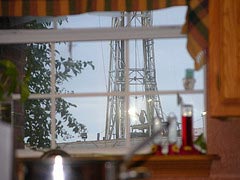
Damascus Citizens for Sustainability is a grassroots group in Damascus, PA. located within the Upper Delaware Basin Watershed.
Site includes excellent links to petition sites, working activist organizations, experts, environmental lawyers, blogs, photographs, and primary documents inlcuding transcripts to testimonials covering the brief history of gas drilling in the U.S.
See: Hearing Set to Shut Down Well Drilling in [Delaware River Basin] Watershed. January 19-26, 2011.
UPDATE: Damascus Citizens. December 16, 2010. e-mail correspondence.
Last week the gas industry withdrew from an important
hearing intended to challenge 14 "test wells" within
the Upper Delaware Watershed region.
The industry withdrew its multiple challenges to our
assertions of the inherent dangers to public health
posed by their drilling activities. At this time we
are reviewing our legal options...
Delaware RiverKeeper Network (DRN), Damascus Citizens for Sustainability (DCS) and Nockamixon Township are co-appellants in Consolidated Administrative Hearings before the Delaware River Basin Commission.
Covalent has been drilling near Cooperstown, NY. In 2008, it tried to purchase water from the Village of Cooperstown for their deep shale drilling. Jim Austin of The Cooperstown Crier (July 24, 2008) reports that the village board has voted not to move forward with the proposal, and Covalent plans to look to Cortland.
“Personally,” said Trustee Lynne Mebust, “I don’t see an upside for the village.” …
Prior to taking the vote, the board listened to comments from the public, which were largely against the sale of water.
Covalent Energy is a privately held exploration and development company focused on developing domestic and international unconventional energy resources.
If you are predisposed to distrust big business and the bureaucrats who regulate it, then “Gasland,” a soberly muckracking film about the health and environmental dangers of the current nationwide rush to drill for natural gas, will light a flame in you...
The accumulation of stories and sympathetic faces is persuasive; it’s buttressed by testimony from scientists like Theo Colborn and Al Armendariz, named regional director of the Environmental Protection Agency in Dallas since the film was completed. Most viewers who seek out “Gasland” are likely to share Mr. Fox’s outrage (which he expresses in melancholy tones) and to accept the picture, familiar and so often true, of heedless profiteering, co-opted and ineffective regulation, Orwellian spin control and innocent, ruined lives. Comparisons to the oil spill in the Gulf of Mexico will be unavoidable...
Mr. Fox shows a general preference for vivid images — bright red Halliburton trucks, beeping but unidentified scientific instruments — over the more mundane crossing the t’s and dotting the i’s of investigative journalism...
Mr. Fox closes with an ominous warning about the threat fracking poses to New York City’s watershed. New Yorkers who are frightened at the prospect will want to know that the state recently tightened regulations governing drilling in that area, at least temporarily.
Cornell University Cooperative Extension. Landowner Information. Links to Landowner Coalitions, Key Points for Property Owners, Gas Rights and Right-of-Way Leasing Considerations for Farms. Woodlands, and more.
See also: Cornell Cooperative Extension (CCE): Natural Gas Resource Center
Europe's dash for gas is leading Halliburton, Chevron and Exxon to consider bringing hydraulic fracturing across the Atlantic.
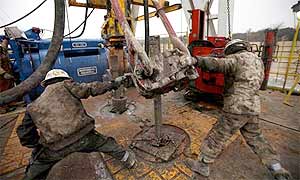
Workers at the Barnett Shale field of Fort Worth, Texas, where hydraulic fracturing technology is needed to release underground gas. Photograph: Robert Nickelsberg/Getty Images
Despite growing evidence from the US of a raft of negative environmental and social consequences of drilling for natural gas using the controversial hydraulic fracturing process, European energy companies are scrambling to secure licenses to roll out extraction projects this side of the Atlantic.
...Experts have increasingly expressed concern that the chemicals used in fracking may pose a threat underground or when waste fluids are transported or spilled.
...'Construction of pipelines could cause problems, but so could the construction of roads,' adds Kassenberg. 'If roads are built to transport water and gas then it will open up pristine countryside to mass tourism, and could bring an additional negative impact to the environment.'
See: France to Unlock Dirty Oil Under Paris With Texan Help
CNX Gas - (a CONSOL Energy subsidary), is the largest producer of natural gas in the Appalachian Basin.
A world record was set by CNX Gas for drilling the most cumulative feet with a single drill bit.
CONSOL Energy purchased the naming rights to the new arena for the Pittsburgh (Pa.) Penguins. CONSOL Energy Center is expected to open its doors in 2010.
On March 15, 2010, CONSOL announced the purchase of Dominion’s Exploration and Production business for $3.475 billion.
According to CONSOL, Dominion Exploration and Production is known as “one of the oldest and most active drillers in Pennsylvania and West Virginia”.
The transaction includes 1.46 million acres for oil and gas drilling with over 9,000 already-producing wells.
Sourcewatch notes that this transaction includes 491,000 acres of land in the Marcellus shale formation of Pennsylvania and West Virginia, and almost triples the amount of land rights CONSOL owns in the Marcellus area.
According to CONSOL’s press release, this purchase will make the company the largest producer of natural gas in the Appalachian basin and give CONSOL “a leading position” in the Marcellus area.
Note: The following articles are summaries only:
See: Consol To Pay $1.4M To End Coal Mining Pollution Suit
See: Va. Landowners Sue Consol Over Coalbed Methane
See: Report: Marcellus Shale Drillers Amass 1435 Violations in 2.5 Years
The Pennsylvania Land Trust Association has reviewed environmental violations accrued by Marcellus Shale drillers working in Pennsylvania between January 2008 and June 25, 2010. The records were obtained via a Right to Know Request made to the PA Department of Environmental Protection (DEP).
The Pennsylvania Land Trust Association seeks to protect Pennsylvania’s special places and landscapes for today and for generations to come.
To increase the quality and pace of land conservation, PALTA helps conservation practitioners improve their effectiveness, builds public understanding, and advocates for better governmental policy.
See also: Drilling in the Marcellus Shale | Academy of Natural Sciences
In April, 2010, the Academy's Center for Environmental Policy presented a public panel discussion, “The Marcellus Shale – The Science and the Policy.” Video of this program is available on our website.
Dr. David Velinsky testifying before the City
Council of Philadelphia on the environmental
impacts of drilling in the Marcellus Shale.
On September 28, 2010, Dr. David Velinsky, vice president of the Academy's Patrick Center for Environmental Research, testified before the City Council of Philadelphia about the scientific questions at hand and need for new research. A copy of his testimony is available for download.
See: New York Times. Conoco, BP, Caterpillar Leave Climate Coalition. Feb. 16, 2010.
ConocoPhillips, Caterpillar Inc. and BP America have left the U.S. Climate Action Partnership, a coalition of more than two-dozen companies and environmental groups lobbying Congress to pass greenhouse gas emissions cap-and-trade legislation.
From Conoco Phillips Web Page: Remediation
We give serious attention to our duty to restore properties impacted by our operations. Our responsibility for remediation can arise from prior contamination on properties we subsequently acquired, contamination of properties we currently own, or contamination of previously owned properties for which we retained individual or joint responsibility for cleanup.
We completed remediation on more than 300 sites in 2008, and currently are restoring more than 3,600 properties in various locations around the world.

Rep. Henry A. Waxman, D-Calif.
"Two of the largest companies involved in natural gas drilling have acknowledged pumping hundreds of thousands of gallons of diesel-based fluids into the ground in the process of hydraulic fracturing, raising further concerns that existing state and federal regulations don't adequately protect drinking water from drilling."
Source: Energy and Commerce Committee Investigates Potential Impacts of Hydraulic Fracturing








